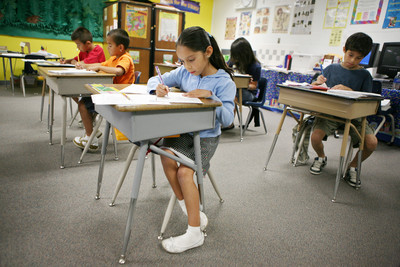District braces for cuts


Increasing third-grade class sizes, making teens walk three miles to high school, and eliminating hundreds of school librarians, computer support personnel and tutors are just a few of the reductions the Clark County School District is considering to cut $130 million from the 2009-2010 budget.
Other proposals include eliminating sports and all after school activities as well as ending block scheduling, which increases the number of classes high school students can take in a year.
These reductions, designed to cut 14 percent from an annual budget that exceeds $1 billion, are on top of a 4.5 percent reduction for the coming school year and the possibility of even more funding reductions for 2008-09 as the result of a special session of the Legislature next week.
"The anxiousness of teachers is growing daily, not only for COLAs (cost of living increases) but in the elimination of positions," said Walt Rulffes, the superintendent of the Clark County School District.
State officials have discussed delaying or reducing 4 percent cost-of-living increases for teachers to make up a hole in the current two-year state budget.
Charging fees for transportation and athletics are also being considered if the school district gets stuck with more funding reductions for the coming school year, Rulffes said.
The uncertainty has made planning exceedingly difficult, said Jeff Weiler, the chief financial officer for the Clark County School District.
"To say we’re all confused is an understatement," Weiler said. "We haven’t pulled out of the driveway and the gas gauge is already low."
For the sake of the discussion, Weiler drew up a list of possible cuts in services if the state reduces funding for K-12 education in the next two-year budget for school years 2009-10 and 2010-2011. The list was not released publicly but the Review-Journal obtained a copy.
The district’s executive staff prioritized the cuts, ranking at the top an increase in class size for the third grade, eliminating high school block scheduling and increasing the high school walking distance from two to three miles.
Third-grade classes currently average 19 students. So the class-size average could rise by two to four students. By loosening its class size limitations, district officials estimate they can eliminate 230 jobs and reduce spending by $15.5 million.
Since teens can drive and have access to the city bus system, school officials did not think extending high school transportation formulas by a mile would too much of a hardship. It would save the school system $3 million.
School officials say they might be forced to cut jobs because salaries make up about 80 percent of the operating budget.
So the district is looking at eliminating jobs across the system, including custodial positions, the extra staffing of tutors and teachers for low-performing schools and support staff for special education teachers.
John Jasonek, executive director of the Clark County Education Association, the teachers’ union, said he supports the idea of planning ahead, but the proposed cuts assume that nothing is going to happen in the next year to offset the need for drastic measures.
It does not consider, for instance, the impact of legislative elections in November and lawmakers taking action to increase revenues in their next regular session in 2009.
Jasonek also fears the lawmakers’ reaction to the proposed cuts. "The Legislature might just say, ‘Fine, go ahead and cut it,’ " Jasonek said.
Many state lawmakers "follow a governor who has no sense of his public responsibility," Jasonek said. "All he cares about is saying he’s not going to raise taxes."
The union leader foresees problems in trying to implement some of the cuts. One proposal to eliminate the preparation time for teachers, a potential savings of $102 million, would violate teachers’ contracts, Jasonek said.
Assistant Superintendent Sue Defrancesco for the northwest region said the "outcomes expected" of schools are going to suffer if these financial limitations are imposed.
"It’s very disheartening," Defrancesco said. "Teachers go to work 180 days of the year with their hearts in the right place. To see the political machinations is very disheartening."
School Board Trustee Sheila Moulton would like to see a long-term solution to the state’s budget woes. "I’m looking for the stability in the tax base so the economy doesn’t whack us every four or five years," she said.
Mary Jo Malloy, president of Nevadans for Quality Education, said the public school system is "already starving as it is. If we continue to make more cuts, it will be devastating."
Malloy anticipated more overcrowded schools, truancy problems and dropouts. "Students are not going to walk three miles in the heat," she said.
"Every one of these cuts will have a negative impact on our students," Malloy said. "I hate to say it, but parents need to wake up and get involved."
Contact reporter James Haug at jhaug@reviewjournal.com or 702-383-4686.
CCSD CUTS BY THE NUMBERS130
Millions of dollars that the Clark County School District is considering reducing from 2009-2010 budget
23
Possible number of students in third-grade classes, up from current average of 19
4%
Amount of cost-of-living increases for teachers that may be cut or delayed
3+
Number of miles from high school a student must live before being eligible to ride a school bus; currently a student must live only two miles from school


















